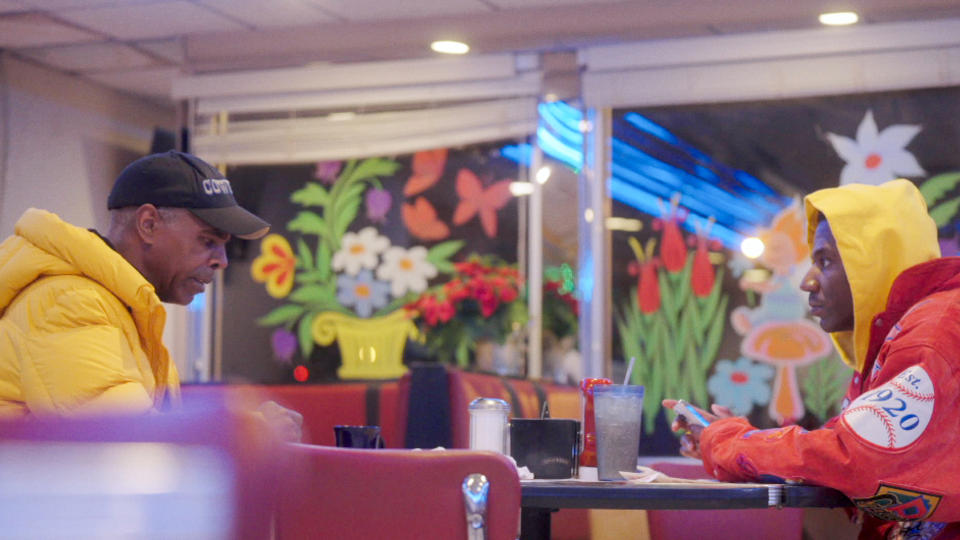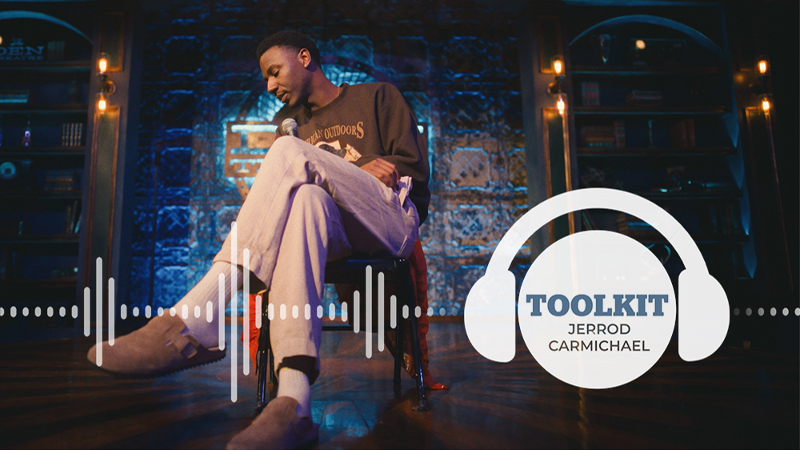The Role of Director and Being a Concerned Friend Merged on ‘Jerrod Carmichael Reality Show’

Ari Katcher is a comedy writer. He’s an expert in story structure and instrumental in helping comedians like Ramy Youssef turn their autobiographical stand-up into a scripted series (“Ramy”). He did the same for his close friend and longtime collaborator Jerrod Carmichael as co-creator of the NBC sitcom “The Carmichael Show” and screenwriter of the comedian’s directorial debut “On the Count of Three.”
Katcher is also the co-creator and director of the unscripted “Jerrod Carmichael Reality Show,” in which the standup turned the cameras on his personal life. The show is revelatory in its unbridled honesty that spares no one, least of all Carmichael himself. It also demanded that Katcher be both concerned friend and a goal-driven storyteller, often at the same time.
More from IndieWire
“I was kind of writing the stories as they go,” he said. “[I was] having to balance what is good for him versus what is good for the story, and hoping, I guess, finding, where is that Venn diagram.”
Soon after “Rothaniel,” in which Carmichael came out of the closet in a narrative intertwined with a family secret (his father’s 40-year affair and having another family), Carmichael began working on new material. In his favorite New York City clubs like City Winery, Bell House, and the Comedy Store, he performed hour-long sets in which he grappled with the fallout from “Rothaniel.”
Carmichael likes to record early performances and share the audio with Katcher, which lets them workshop material — the structures that work and the themes that emerge, all pointing toward the heart of whatever Carmichael wants to express. Their assumption was Carmichael would turn it into another standup special.
“We’d leave that conversation and it felt like there was some clarity,” said Katcher of their post-performance calls. “Then he’d send me a tape the next day, as he did another hour, and it would be a 100 percent different hour. And then that just kept happening over and over again.”
It became clear that the stage was a real-time platform for Carmichael’s immediate issues. Said Katcher, “He was kind of spiraling about wanting this relationship with his mother, his father, so every time he talked to [them] it was [a] whole new, ‘Here’s what really upset me about this conversation,’ ‘Here’s what I want her to understand,’ ‘Here’s what happened in that conversation when I snapped at her.’”

Katcher told Carmichael, “It just seems like you want to have these very funny and exciting therapy sessions on stage.” And that was true: While on the Toolkit podcast, Carmichael credited psychoanalysis with many of his breakthroughs of the last four years.
“[If] you’ve been three decades of hiding, I think there is something about once you [realize], ‘Oh, I can say these things and not only is it okay, but it also it’s healing and removes this huge burden I’ve been carrying around for so long,’” said Katcher. “I think there is this deep desire to do it again and again. But it doesn’t really lend itself to a comedy special.”
The collaborators started talking about a different type of creative vehicle. They broached the idea of doing a reality show, but were convinced the only way that could work is it had to be honest — not a vanity project — and it had entertain.
“Entertainment is all about conflict and overcoming obstacles,” said Katcher. “We’re not just following him around with a camera as he eats food.”
Katcher believed that Carmichael would need to confront a minimum of eight obstacles in his life to create an eight-episode season. “That’s why it was helpful to be such a close friend of his,” he said. “Sometimes he would just say, ‘What do you think is the most pressing thing that I need to confront right now?’”
As an example, he pointed to Episode 4 in which Carmichael goes on a road trip with his father. He thought the premise shouldn’t simply be confronting his father; instead, he proposed a road trip to his father’s hometown, with the framing device of his son trying to better understand him.

“It was helpful to be able to step back and say, ‘Look, I think there’s a lot of things right now that you’re holding back from saying to your father. You keep talking on stage about how your conversations with him are very unsatisfying, and I think that’s because there’s a lot you haven’t said to him,” said Katcher,
While it made for compelling television, the confrontation in Episode 4 doesn’t create the breakthrough Carmichael or Katcher hoped for. With both of Carmichael’s parents, it is a game of inches. While Carmichael said on the Toolkit podcast he valued the show for being a vehicle to confront the things he avoided in his life, Katcher saw an additional benefit.
“I just know Jerrod,” Katcher said. “Sometimes he can – I think he’d be okay with me saying this – I think he can be a little indecisive and spiral a little bit in terms of how to handle a problem in his life. But there is something about the cameras being on that makes him jump into action a little bit.”
This is definitely the case with Carmichael’s crush on his friend, musician Tyler, the Creator, which became a near-constant topic in Carmichael’s nightly impromptu performances.
“The year before we started filming the pilot, every time I talked to him on the phone, he’s telling me about Tyler and these feelings he has, and every time they hug, ‘What did that mean?’” said Katcher. “He’s reading into every little [thing]. There was something about him coming out so late — he says this in the show — it’s like he’s like a teenager in gay years and it’s really true. He was talking about this crush in a way that felt familiar from high school.”
In the pilot episode, Carmichael is in Los Angeles for the Emmys and his invitation to Tyler to be his guest at the ceremony has gone unanswered. Here, Carmichael and Katcher staged their first confrontation: The musician would come to his hotel room and Carmichael would address Tyler on camera about the awkwardness and distance that had grown between them since he admitted having feelings for his friend.
You can watch that scene, and listen to Carmichael discuss it in the video below:

The scene is as hard to watch as you might imagine and it probably would never have happened if Carmichael didn’t use the excuse of his reality show to address very uncomfortable truths. To Katcher’s point, it ended a year of Carmichael’s spiraling — so much so that, between filming episodes 1 and 2, Carmichael fell in love for the first time.
The introduction of Mike, Carmichael’s first real boyfriend, created situations where Katcher’s role as friend and director fully merged. This presented the biggest challenges and potential benefits of the storytelling experiment. Carmichael loves Mike, but cannot stop cheating on him — something revealed to the camera, before Mike.
“He was having these like compulsive issues and he was beating himself up about it. It was truly painful to watch him go through that,” said Katcher. “I could see how badly he felt about himself every time it would happen and how much he would tell himself that it wasn’t going to happen again. I was like, ‘Look, I think you need to start talking to some therapists.” There was almost like life-coaching elements, which is a weird thing [for a director].”

Katcher said he wonders if Carmichael would have been so proactive without the camera and if the relationship would have survived (they are still going strong). He could imagine another six months of Carmichael spiraling rather than quickly seeing their sex therapist Joanna, being honest with Mike, and addressing his sex addiction.
“Jerrod has never been a particularly good liar, but he’s especially bad when it’s on camera,” said Katcher, recalling an early episode in which Carmichael is aware the filmmakers know he’s lying and how painful it was to hear the pitch of Carmichael’s voice rise as he lied on camera. “He didn’t sit on the secret and he didn’t wait till the show came out for Mike to find out, thank God. They had to confront these things quicker. That was really satisfying to watch as a director and as a friend, who doesn’t want to see his friend cycle and suffer. It was really fulfilling.”
Best of IndieWire
The 13 Best Thrillers Streaming on Netflix in May, from 'Fair Play' to 'Emily the Criminal'
The Best Father and Son Films: 'The Tree of Life,' 'The Lion King,' and More
The 10 Best Teen Rebellion Films: 'Pump Up the Volume,' 'Heathers,' and More
Sign up for Indiewire's Newsletter. For the latest news, follow us on Facebook, Twitter, and Instagram.

 Yahoo News
Yahoo News 
